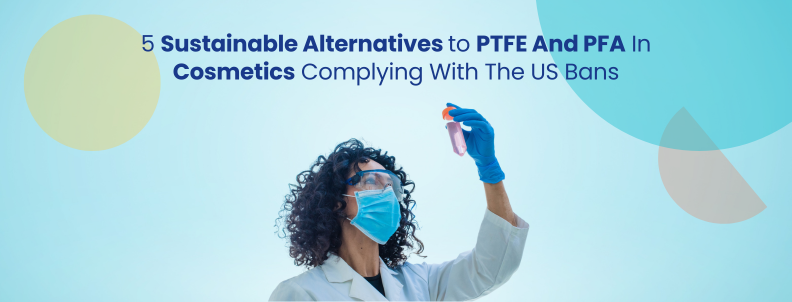Since the news of lurking bans on PFAS, there has been a frenzy across many industries to find suitable alternatives. The cosmetic industry, in particular, has been deeply impacted by this news.
PFAs in cosmetics constitute a significant part of waterproof makeup, sunscreens, and anti-aging creams. However, besides severely contributing to environmental destruction, studies show these “Forever Chemicals” contribute to hormone disruption, immunotoxicity, and cancer.
Therefore, it has become the need of the hour for the cosmetics industry to adopt more sustainable and safe alternatives to PFAs and PTFE (a type of PFA). To help you out, we scoured through scientific and patent literature to find the best PFA alternatives in cosmetics, along with the companies working on them.
Let’s hop on to the list and find the best solution for you!
1. Fatty acids derived from Estolide oils
According to a research paper, they are bio-based oils that have advantages such as good biodegradability and cold flow properties.
Additionally, they have shown promising potential as commercial products for personal care and lubricant base oils in automotive, industrial, and marine applications, aligning with the increasing demand for bio-based products over petroleum-based ones.
BioEstolide, a patented technology from Biosynthetic technologies, is derived from organic fatty acids sourced from Estolide oils and offers properties like; skin protection, and moisturization, while also enhancing the sensory experience.

In a few other uses, when applied to hair, BioEstolide™ 250-100 also forms a protective barrier that helps retain moisture and shields against heat while imparting additional shine for a healthier appearance. Additionally, BioEstolide has been extensively proven as an ethical, sustainable, and natural substitute for silicone. Moreover, since they are already commercially available, they are a good alternative for PFAs.
The company has received a $7.5M investment from HG Ventures for R&D in developing sustainable products for various applications.
2. Biodegradable synthetic wax with boron nitride and zinc oxide.
Microsilk 422, a unique product offered by Micropowders Inc., is a micronized synthetic wax used in various industries for coatings, inks, and personal care products. They have been tried and tested in the formulations of various products that provide enhanced matting, improved texture, and a silky feel. Additionally, it reduces friction and increases lubrication in creams and, most importantly, offers comparable characteristics to the PTFE, a form of PFAS.

Micropowders is also expected to launch a microcrystalline cellulose-based ingredient for cosmetic products which will add sensory effects to Microsilk 422. The company already has a patent pending application for the same.
3. Bio-Alkane based solution
Silicones, being odorless, colorless, and non-greasy, have found their application in cosmetic products as a replacement for PFAs. But due the environmental concerns, silicones have also been under regulation by various countries like the EU.
To solve this, Lubrizol has developed SilSence Bio 5, an alternative to silicone as a sensory modifier in cosmetic products. SilSence Bio 5, when incorporated into hair care products, imparts softness and smoothness to the hair strands in wet and dry applications. This emollient enhances volume and effectively controls frizz while benefiting the scalp through moisturization and improved barrier function.

This reflects the exact functioning of SilSence Bio as that of PFA in cosmetic products, more specifically, hair products.
The company has also won an award at In-Cosmetics 2023 for this product and Silver in the 2023 Makeup Bar Award at in-cosmetics® Global.
Additionally, the company in 2021 had collaborated with Advonex Beauty to develop alternatives to silicone, petroleum, and mineral oil for their beauty products.
4. Polyamide powders
Polyamide powders are REACH-compliant and present a substitute for PTFE waxes in cosmetics. They reduce friction and improve abrasion resistance gloss while ensuring compliance with evolving regulatory requirements.
Orgasol® powders are products from Arkema that serve as effective smoothing agents, contributing to a reduction in the coefficient of friction and enhancing lubrication in cosmetic creams. Additionally, the company has a patent pending WIPO application for the improved polyamide-based composition.
Arkema won the best sensory ingredient award at In-Cosmetics 2019 for Orgasol.
5. Polyethylene-based wax
Polyethylene-based wax is another alternative to PTFE as a cosmetic ingredient for reducing friction and enhancing the spreadability of creams on the skin.
Several companies, like Mitsui Chemicals, have commercialized PE wax called MIPELON, which claims to have achieved superior properties than PTFE for reducing friction and increasing spreadability. Other companies like Micro Powders Inc. have also commercialized the same material as an alternative to PTFE in cosmetics called Micropoly 220.
Therefore, PE wax is a ready-to-use alternative to PFAs in the cosmetic industry. Furthermore, the global polyethylene wax market was estimated to be worth US$ 1.0 billion in 2022. And it is further expected to increase at a 5.1% CAGR from 2023 to 2031, reaching US$ 1.6 billion by the end of 2031.
Conclusion
As consumer awareness regarding eco-friendly and non-toxic cosmetic products continues to rise, the demand for safer and more sustainable alternatives to PFAs in cosmetics is becoming paramount. The potential solutions hold promise in addressing the concerns associated with PFAs. However, the cosmetic industry might face challenges in adopting and commercializing these alternatives on a larger scale.
With our expert insights and solutions, you can easily navigate this challenging landscape and find the best PFA and PTFE alternatives for your products. Stay at the forefront of a cleaner and healthier future in the cosmetic industry.
Authored By- Midhat Yassin and Gaurav Dhiman, Patent Search
Edited By- Moksha Jain, Marketing











